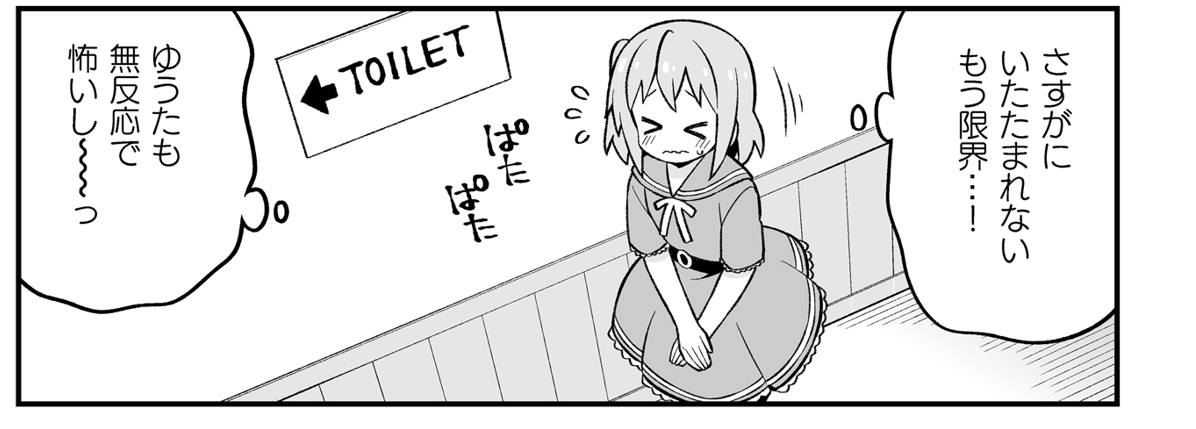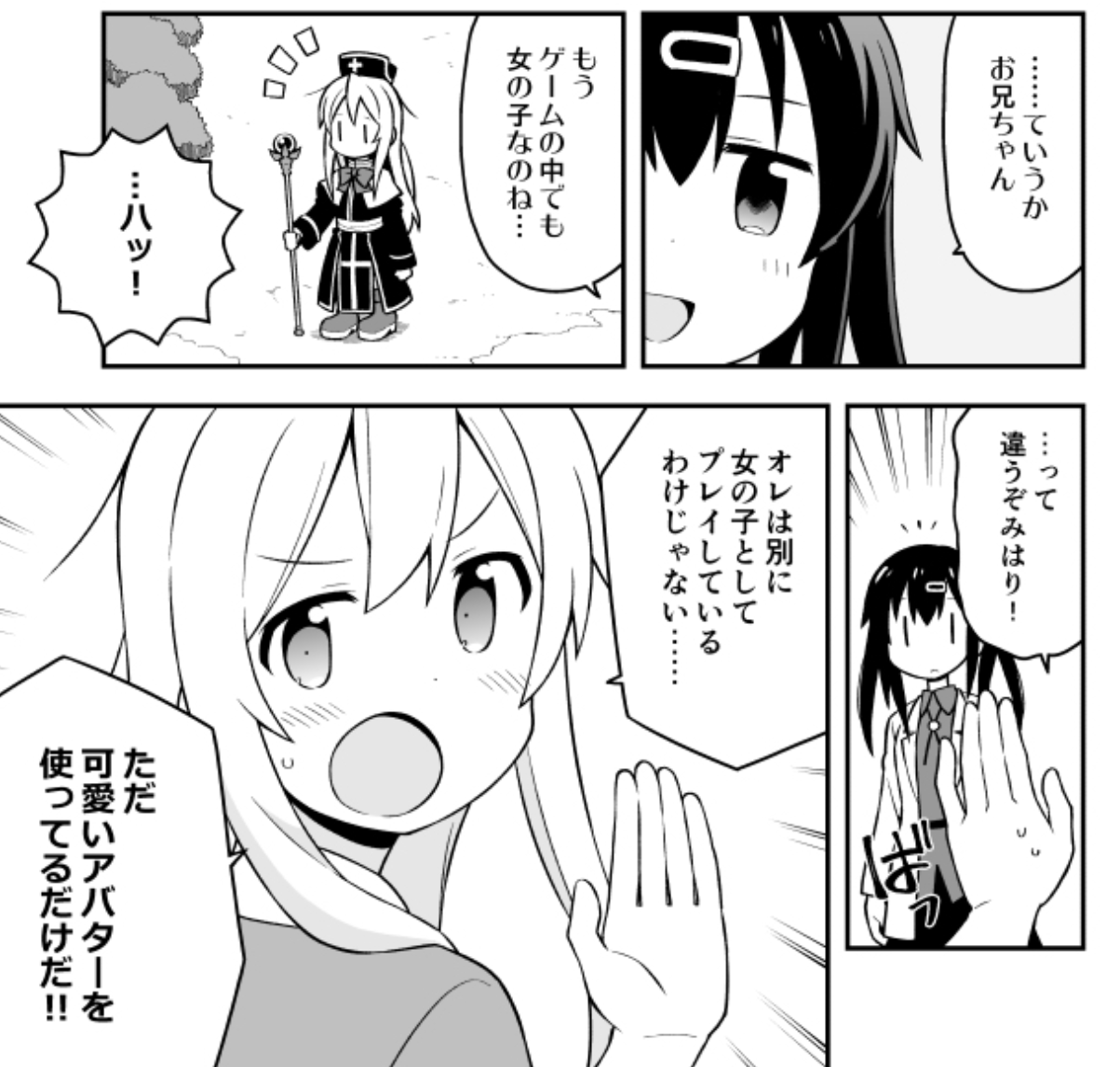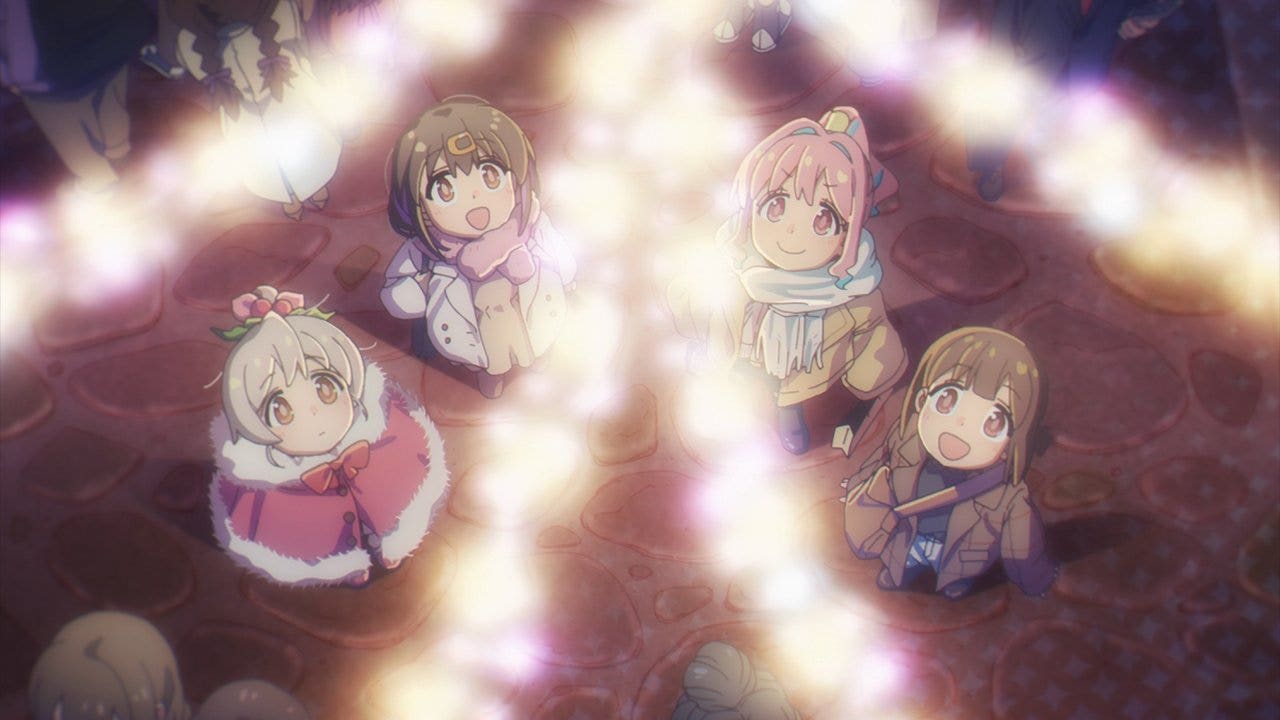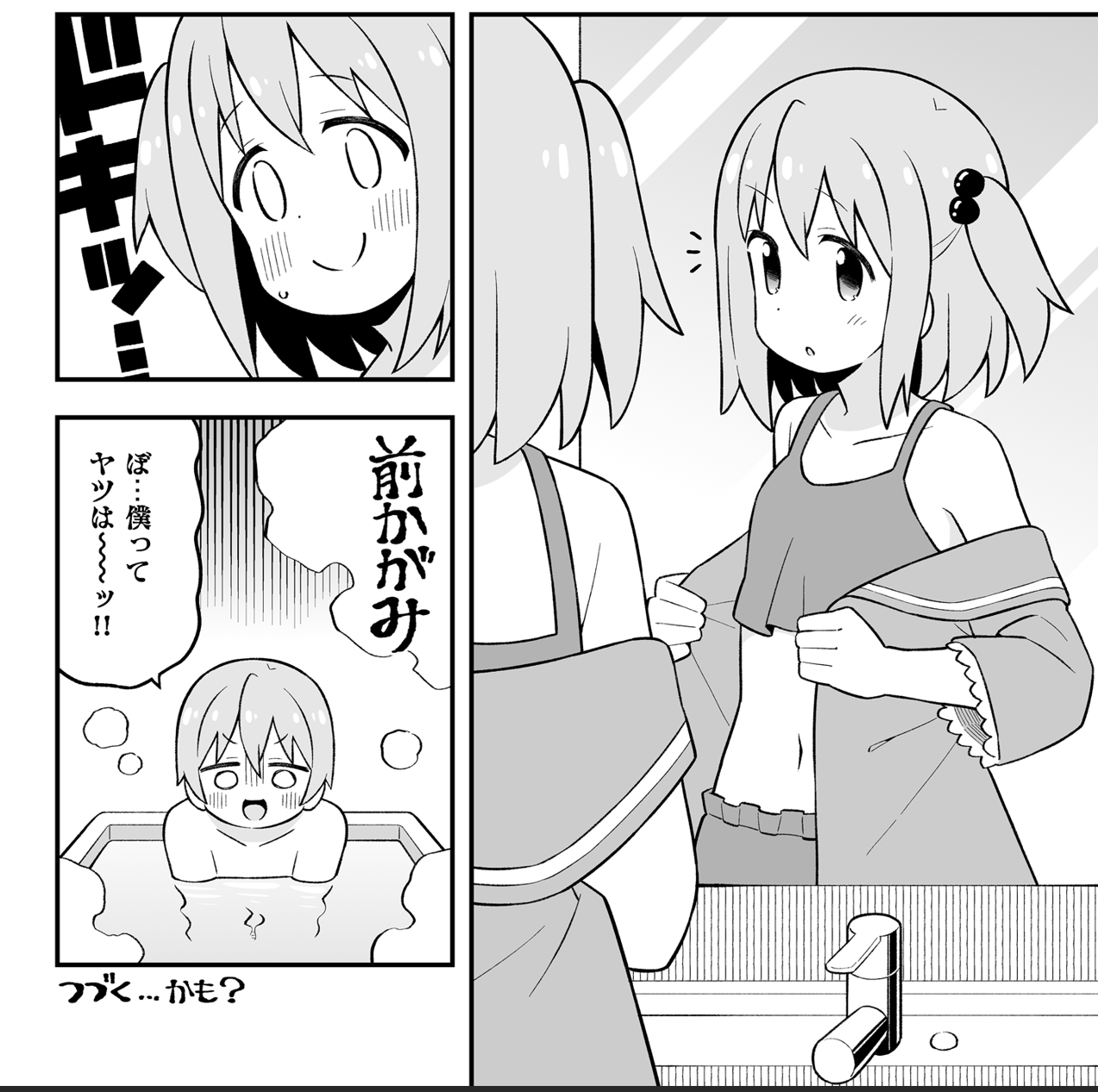On The Perverted Stuff In Perverted Fiction Onimai And Piss Jokes
5 8月 2024

If I were writing this for an academic journal, the title would be something like "Preliminary Remarks on Perversion as Liminal Spaces Within TSF Fiction". No one would read it, but it should give an idea of what I want to say about the exploration of sex in this genre.
This post will discuss the sex and piss jokes in Onii-chan wa Oshimai! series.
I think Mahiro is very funny.
I've been reading Nekotofu's Onii-chan wa Oshimai! (translated as Onimai: I'm Now Your Sister!) and its spin-offs lately. For the uninitiated, this is a doujin manga series about an older brother who was given a miraculous gender potion by his younger sister, turning him into a cute little girl.
Ooyama Mahiro, our protagonist and who I will use she/her pronouns for from now on, is given a new life as a middle school student from her deadbeat adult past. Mahiro finds herself experimenting the everyday practices of being a woman her age: going to hairdressers, window shopping, doing fortune-telling with her classmates, and dressing up in the most adorable clothes. I won't repeat too much of what I said about the anime adaptation, but my main point still stands: what I find admirable and enjoyable is how the euphoria she experiences is not so much a fantasy as a "potential present" that is unfortunately blocked by material reality. In a more equitable world, I think trans people should have the same experiences that Mahiro was able to have.
But for most people, when they think of the show or the manga, they usually think of how fetishistic it is. When I started reading the manga on Pixiv, I was deeply impressed by Nekotofu's fascination with piss. One of the later chapters just starts with Mahiro pissing in the toilet. The reason given in the story is that women have smaller bladders, so Mahiro has trouble getting used to it and finds herself pissing a lot. I'm not sure about the science of that.
So no matter how you look at it, Onimai is a fetishistic manga from conception. Here lies the part where I should say something about what I think about the content. While others may write detours in their video essay scripts to explain away the fetishism or provide a moral justification for problematic content, I honestly don't care.
Let us instead talk about fetishes.
Because Nekotofu slams the audience with so many of their fetishes, the manga makes it clear where their priorities lie. What they consider good humor often borders on what they consider funny and erotic. I've noticed that if a chapter starts with Mahiro pissing herself or growing her dick in the most uncomfortable situations, it's going to be pretty good. It's juvenile and stupid, and that makes the episode quite funny and interesting.
I am going to christen this phenomenon as "the perverted stuff". This is an undeniable feature of Onimai, and I think it is this remarkable aspect that makes its exploration of gender ambiguous, conflicting, contradictory, and fascinating. Its "unclean" nature allows for a deeper exploration of what sexuality and gender can be.
This isn't a novel idea. Writers like Esther Newton (Mother Camp: Female Impersonators in America) have written books about drag culture and -- especially the latter -- how they problematize understandings of gender through their humor, the clothes they wear, and so on. This allowed future thinkers like Judith Butler, in the deeply unreadable book Gender Trouble, to describe gender as performance.[^1] There's something to be said about how we can discover differences and contradictions in the subjects we study, and then extrapolate to make a general statement about societal norms.
But I find these explorations on drag culture to be, well, outdated and a bit irritating. The amount of detail these works go into has little relevance to how I interact with gender norms on a daily basis. I don't crossdress, and I'm more concerned with how I present myself online than offline. While there are more valid arguments I could make against these works, I find these studies unproductive mostly because they don't give me anything to work with.
Meanwhile, I think the Onimai manga fired up my neurons. What does it say about gender and Mahiro that her dick came back and she was so horrified that her classmates turned her on that she immediately sought the gender potion so she could stop thinking dirty thoughts? Or her confusion at being seen as a mother figure, even to a high school student, because she is able to empathize with people in a very caring way? It's all horny shit, mind you, but I think the speculation from silly fetish jokes like this is quite fun and profound.
I like to think of "the perverted stuff" as an environment to imagine absurd scenarios. Mahiro is an avatar to explore situations like menstruation as fetish comedy. She's familiar with masculine activities like keeping pornography under the bed, but she also likes to play as girly characters in MMOs, even before she was drugged.

Mahiro will once in a while describe her struggle to preserve her manhood, but she's always thwarted in surprising ways. Part of it always comes from other people's redescriptions of what she initially thought were masculine activities; there's a running gag with two guys who think she's the ideal girl because she's a hardcore RPG gamer. She'll even try to take off her clothes in class if it's too hot, only to be stopped by her classmates who think it's too revealing. Rather than seeing this comedy of errors as her being unaware of gender norms, I like to see Mahiro as a character who believes that she is being consistent with her gender identity and is constantly expanding her horizons when the accidents happen.
For the manga, "the perverted stuff" functions as a kind of playful, liminal, and ambiguous space that allows gender conventions to be the joke. It's funny when Mahiro is confronted with the realization that the "manly" things she can do are considered "feminine," or that she finds the feminine activities (which include a lot of outdoor activities) far more preferable. Most importantly, her male NEET traits -- social withdrawal, laziness -- are rendered as a kind of lazy imouto figure who needs some vitamin D. For all intents and purposes, Mahiro is usually perceived as a girl.[^2]
In fact, one of the things observed by characters who know her identity (specifically Mihari, who is Mahiro's sister) is that the most dramatic change comes not specifically from sex itself but from Mahiro regressing to a younger age and what that culminates. Mahiro knows too much about sex for her young age[^3], but she'll also act like a big baby. Onimai seems to suggest that the fantasy of age regression and age in general might play a huge factor on how we define gender.
These are all preliminary remarks to a larger project, but I hope that my sketches of sexual comedy suggest that there's something profound about noticing the patterns and why perverse laughter can arise from these situations in depicting the fissures found in gender. By turning our current notions of gender into perverted jokes, Onimai defamiliarizes them and makes us laugh at the absurd.
Before I close this section, I want to mention the chapters and the anime adaptation that don't get this pervy. Because we are so used to the breakneck pace of the fetish jokes, these chapters often come as a surprise. As of this writing, the latest chapter is #90 and it features a high school character who learns that she has passed the entrance exam. She decides to celebrate the end of an era by having her friends and Mahiro dress up like her and take pictures. I found this chapter to be bittersweet and poignant.
The anime adaptation, on the other hand, amplifies these moments. One particular episode (#9) features a dialog-less montage of the cast looking over the Christmas lights and taking pictures together.

No jokes, just beautiful visuals and animation. The segment lets the atmosphere speak for itself, and you can feel Mahiro learning to take in a new sight for the first time.
While these moments are clearly meant to be breathers, I also think they are only possible because the "perverted stuff" has allowed them to grow as people. All these misunderstandings and transgressions allow them to grow. These moments allow us to reflect on the journey these characters have taken.
I think that's why they can suddenly make people feel something and cry because they didn't realize they were growing with the characters in their misadventures. This growth is something I want to comment on, and it's part of why I wanted to write this essay: to make it visible.
Closing thoughts, or why I wrote this essay:
I don't want to claim that what I've written is a very sophisticated defense of this juvenile humor, nor do I want to convince people to start laughing at pee jokes with me. I'm also skeptical of moral arguments that basically suggest that the only people who can ethically enjoy this stuff are trans women.
This non-stance leads me to proclaim the following: feel free to view Onimai and fetish media as morally indefensible. I have no problem with people finding these works distasteful. However, I do get annoyed when people refuse to see them as analytically interesting.
I find works like Onimai interesting in the same way that academics used to look at drag culture to explore notions of gender. Onimai is a playful work that uses perverted comedy to provoke me to redefine my own understanding of gender. This is a deeply self-serving (in academic terms, self-reflexive) approach to discussions of gender and sexuality, but I want to stress that these works are very insightful to the questions I have.
When I write about my thoughts on a piece, I like to think about the times I'm in. Right now, we're in a lot of ideological battles about gender (last time I checked Twitter, there's some talk about transphobia at the Olympics), and that means gender has become extremely contested. Very little of this shit is funny. There's a lot of dark stuff out there. When I write about how hilariously provocative Onimai is, I think about how gender comedy can still be provocative and funny to me.
And I think part of the comedy comes from me recognizing the absurdity of the political situation. When transphobes ask people to think about gendered restrooms, Onimai thinks about Mahiro's hesitation to enter the women's restroom. I doubt Nekotofu is thinking about the real world implications, but I do.
This essay is, in a way, my attempt to ground my sense of perverted humor in the present time and space. It's possible that in the timeline of Post-Indigenous States and Trans Respecting States of America, I would find Onimai uninteresting to think about.[^4] But since we are in the present, I think what I find fun and insightful comes from the work that disrupts my current thoughts about gender and sexuality.

Whatever you think of Onimai, I think it's worth learning a thing or two about how its humor could lead to some interesting avenues on gender. Its bizarre digressions can lead to alternative paths not easily taken by "serious" academics, thinkers, and activists. And I will always find "the road not taken" to be the riskiest and possibly most rewarding endeavor.
[^1]: If you are interested in the legacy of Mother Camp without reading it, this review from American Anthropologist is quite good. Personally, I like this book more than Butler's... [^2]: One incident does stand out: in chapter #83, the scientist who knows Mahiro's identity hesitates to give her New Year's money because she sees her as a man who has come of age. The joke is, of course, about children receiving money, and should be seen as a generation joke, not a gender joke. [^3]: This section of the post focuses on Mahiro, but I'll be remiss to point out that some of the comedy relies on the different characters' knowledge of the birds and the bees. A common joke involves a blunt reference where one character (Asahi) is completely confused. [^4]: This doesn't mean I might not find it funny. I do find a lot of juvenile humor hilarious to this day.